Where are they now?” Part 7 of our series featuring former TSA Surveying Course students
When I was 16, I spent a month in Uganda working in an orphanage, during my time there I was asked if I wanted to help carry out some setting out of new roads and building plots using a theodolite and tape measure. I really enjoyed the experience but didn’t think much about it for a while. A few years later, I saw an ad for a trainee surveyor role, offering the chance to travel and do fieldwork. My current employer was going through a round of redundancies, so the timing was spot on – fate even! I’ve always been into Geography and the outdoor life, so it felt like a natural fit and that’s where it all began.
Finally understanding the “why” behind what I was doing every day in the field. I was keen to get that deeper knowledge, not just how to take measurements, but how to process and check the data properly. Anyone can collect points, but the course really taught me how to spot when something’s not quite right and how to fix it. It was also a brilliant chance to meet people from other companies and share experiences, but it was the tutors who really made an impression – they were knowledgeable, approachable and genuinely passionate about the subject. I still keep in touch with some of them now.
If you treat surveying as just following a process, you can easily get stuck doing things one way without considering different methodologies. This isn’t an industry where one size fits all. The school helped broaden my knowledge and understand that there are many ways to create the required deliverable within your client’s time and cost constraints.
What I really enjoy about being a Regional Sales Director is the variety. I get to work across the whole company and meet an incredible mix of businesses, from police forces and construction firms to local authorities. Every day is different. I love helping make things happen and solving problems for colleagues and customers and really appreciate those moments when it all comes together. There’s nothing better than seeing a colleague succeed or a customer genuinely happy. I also really value the flexibility the role gives me to balance work and family life.
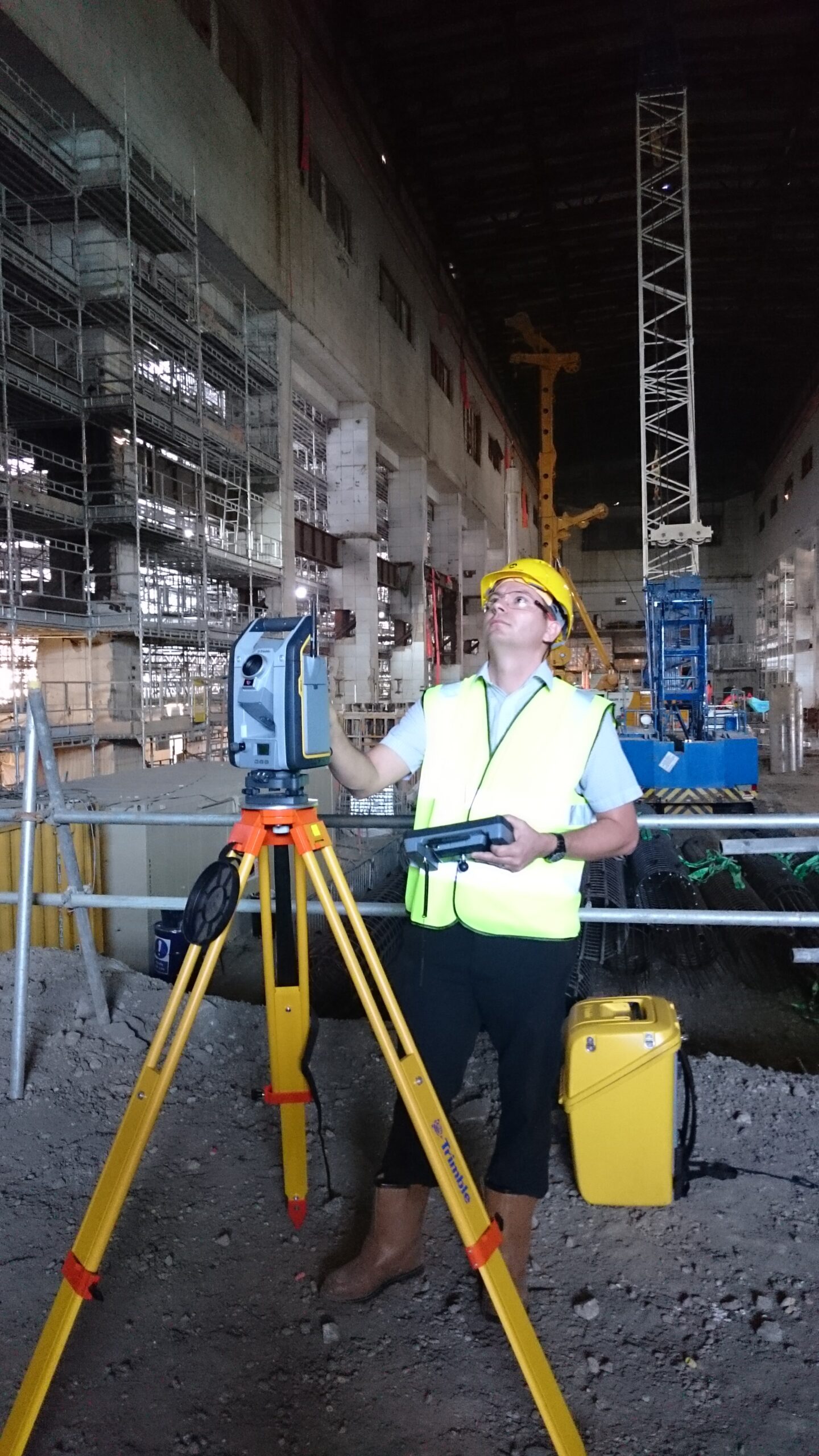
Challenging, ever-changing, rewarding.
I tell people that surveying is one of the most varied and interesting careers you can have. You’re constantly meeting new people and seeing new places, so no two days are the same and it’s a world away from being stuck behind a desk. Just in the past couple of months, I’ve been at black-tie events, laser-scanned the roof of a church and inside an HS2 tunnel, helped get a GNSS system running on a dredger and supported customers both onsite and over the phone.
Firstly, to get involved with personal development so you can meet more people and become more knowledgeable. If someone asks you if you can do something, or want to learn to do something, say “yes” and broaden your horizons. Secondly, don’t be afraid to ask – we’re a profession that can learn from those with long years of experience and from those relatively new to it who bring different skill sets.
Exciting things happen all the time at KOREC, whether that’s because we are among the first in the world to try out new technology, or because we work with customers on some of the most high-profile projects in the country, visiting the sites and talking to those involved.
I was involved in many projects that required return visits, the most memorable of which were the beach surveys. Often working in teams of up-to fifteen people, staying away for a week, solving problems on the fly in some of the most remote coastal areas of the UK, is a great way to understand teamwork! These projects delivered glorious scenery all around the UK coastline from the far depths of Cornwall up to the Scottish boarders and often included quad bike surveys, great team spirit and, best of all, a visit from my family.
Every KOREC promotion I’ve earned has been a proud moment, especially when I became a Regional Sales Director. This role means I’m responsible for my own team and it’s been extremely rewarding.
It’s hard to narrow it down to just three, but I’d say: First, I really enjoy giving talks and spending time with students, whether that’s at The Survey School or other educational settings. It’s great to see their curiosity and help spark an interest in the profession. Second, I love that moment when a potential customer is genuinely won over and can see how our team can make a real difference to their work. It’s incredibly satisfying. Third, I really appreciate when customers come back to ask for advice, saying things like “this is working so well, we need more.” It’s a great feeling to know you’ve helped them succeed and that they trust you to keep supporting them.
I’ve always had a strong interest in geography and a love for the outdoors. At the time, my only exposure to surveying was through roles like quantity surveying and condition surveys, which I knew of through my brother, who was an architect. It wasn’t until I began working at IETG, now part of SOCOTEC UK, as a Workshop Technician that I discovered land and utility surveying thanks to 40SEVEN, a sister company. When a Trainee Surveyor position became available, I saw the perfect opportunity to combine my passion for hands-on work, being outdoors and learning new skills. I applied and from that moment on, I was hooked! Land and utility surveying has become a true career path for me, and I’ve never looked back.
I really valued learning the theory behind the practical work I was doing day-to-day. Gaining a deeper understanding of the “how” and “why” behind surveying significantly improved my skills and made me a more effective surveyor. As a kinesthetic learner, hands on experiences are how I learn best, and school played a crucial role in supporting that. It not only strengthened my knowledge but deepened my passion for the profession. I’m genuinely grateful to The Survey School, Andrew Crumpler, and everyone else who supported me throughout my journey
Check, Check and check again! It’s always better to do more and have the choice to use and or delete what you don’t need.
I currently work as a Survey Instructor for Mid-Kent College at 1 RSME, and I feel privileged to be in a role where I can help shape the next generation of surveyors and soldiers. It’s incredibly rewarding to pass on knowledge and experience and to see trainees develop into capable surveyors. I deliver training that equips them with the skills to operate in both civilian and military environments, using a range of equipment from levels to S5 Total Stations and the X9 Scanner. We focus not only on technical proficiency but also the importance of accuracy, data processing, and producing clear, reliable drawings that meet operational demands anywhere in the world.

Technically 4 words (3 is so hard!) : Blessed, Life Changing, Team, Learning
I’m genuinely passionate about it, it’s given me the opportunity to explore a wide range of experiences and roles. In previous and current roles, I actively supported and help train trainees and staff, sharing both technical knowledge and on the job insight. Whenever someone asks about my work, I’m always eager to talk about surveying and highlight how it’s connected to so many aspects of everyday life. I try to relate it to familiar objects or tasks to help people see just how relevant and impactful the profession is.
I particularly want younger people to have access to the same opportunities I’ve had. The Survey Association course played a huge role in shaping my understanding of how and why surveying works. I believe it’s a vital foundation for anyone entering the field combining solid theoretical knowledge with practical experience to develop well-rounded, capable surveyors.
Be open to every opportunity. Too often, we say “no” out of hesitation or fear and miss out on experiences that could lead to growth. It’s far better to try and stumble than to never try at all. You learn more from taking a chance than from standing still.
I am currently involved in updating and enhancing the Hydrographic phase of the course. As part of this effort, we are collaborating with the Royal Navy. Recently, RN personnel joined us on the Tactical Support Boat (CSB) on the River Medway, where they observed our training exercises using the Total Station, GNSS, and the SonarMite system. In Trimble Business Center (TBC), we demonstrated how the hydrographic data could be integrated into a topographical model to create a more comprehensive survey output. Looking ahead, we are planning further engagement with other branches and specialisations, including a visit to Devonport to connect with the Hydrographic Exploitation Group (HXG).
I worked on the Manchester Airport expansion project, which required a comprehensive topographical and utility survey covering both landside and airside areas including the taxiways. Working airside brought a unique sense of privilege and responsibility. The project demanded close coordination and planning between our survey team, the main contractor, ground control, and various subcontractors. It was a complex and fast-paced environment that constantly challenged me to adapt and find solutions under pressure. Now that the project is complete, I feel a strong sense of pride every time I visit the airport. I often find myself thinking, “I surveyed that.” Revisiting past project sites always brings back valuable memories and reinforces the professional growth I’ve gained through those experiences.
I can’t pick just one! Being part of The Survey Department Team at 1 RSME. Picking up the Institution Medal by the Chartered Institution of Civil Engineering Surveyors (CICES) – and passing the TSA Course!
TSA Conference and Awards Day is the cornerstone of our annual events calendar. Far from being just a formality, it is a significant occasion where successful TSA Surveying Course students, member companies and surveying professionals come together to honour hard work, dedication and excellence in the field.
However, TSA Conference is not just about accolades, it’s also about inspiration. Our special keynote speaker was Mandy Hickson, the trailblazing former Royal Air Force fast-jet pilot and motivational speaker. Drawing on her risk-taking, team and leadership skills Mandy inspired attendees to embrace challenges and think big. In Top Gun, Maverick says “It’s not the plane, it’s the pilot” and the same holds true for surveying. Skill, training and experience matter – people matter.
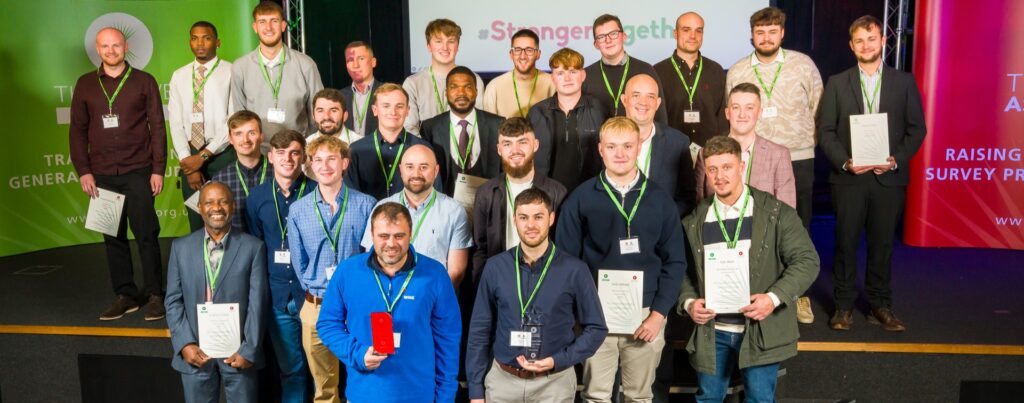
Completing the surveying course is also no mean feat! We were thrilled that nearly all 29 qualifying students could join us for the day. This included delegates from Sint Maarten in the Caribbean, who regularly travelled to the UK specifically for the excellent training The Survey School provides.
Five students achieved a Distinction this year, with an average 85% or higher in all of their classwork, assignments and exams. The 2025 Best Student Award, jointly sponsored by TSA and Leica Geosystems, was presented to Max Heaton of Centara, both for his exemplary work, attitude and team playing. TSA Vice-President’s Special Recognition Award went to Theodor Suhan, a self-funded student commended for his high standards and unwavering perseverance. Luke Appleton of Archidata received the CICES prize for Best Assignment, achieving a remarkable 100% for his work, commended for its meticulous attention to detail.
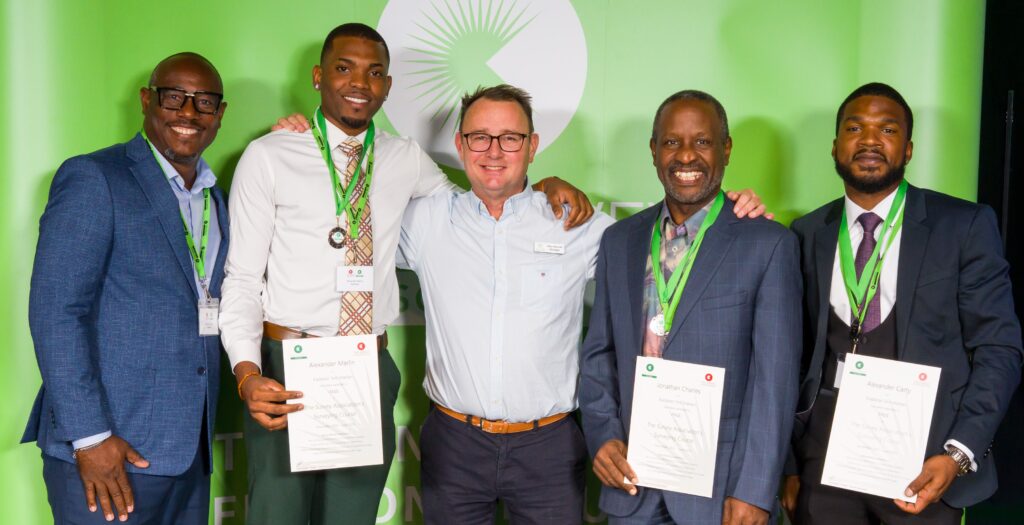
The skills and knowledge acquired studying at The Survey School undoubtedly helps equip its students for a bright future career. Many also tell us they have forged friendships that will last a lifetime. The conference day too, provides a platform for survey professionals to come together, share insights and make valuable connections.
“It’s 100% going to improve the quality of my work going forward. It’s a great foundation for any new surveyor – it makes you think about what you do every day from a different angle”
“It’s been great – meeting new surveyors, improving my knowledge and progressing”
“I’d like to keep in touch with The Survey School tutors as they have been a great support network”
TSA Conference and Awards Day is more than a celebration, it’s a pivotal moment for students to reflect on their journey, to network and look forward to a promising future in land surveying.
We are dedicated to continually reviewing and modernising our course offerings to ensure Survey School students are not only well-prepared, but excel in the ever-evolving landscape of surveying.
The Survey School is proud to announce the re-approval of our TSA Surveying Course by the Chartered Institution of Civil Engineering Surveyors (CICES) for a further five years.
This endorsement, achieved following a comprehensive audit, emphasises our dedication to excellence in geospatial training, equipping students with the skills and knowledge they need to thrive in the surveying profession.
Survey School Manager, Alan Mansell, expressed his delight:
“We’re thrilled to receive this ongoing approval from CICES. It’s a fantastic recognition of the quality of the training we deliver”
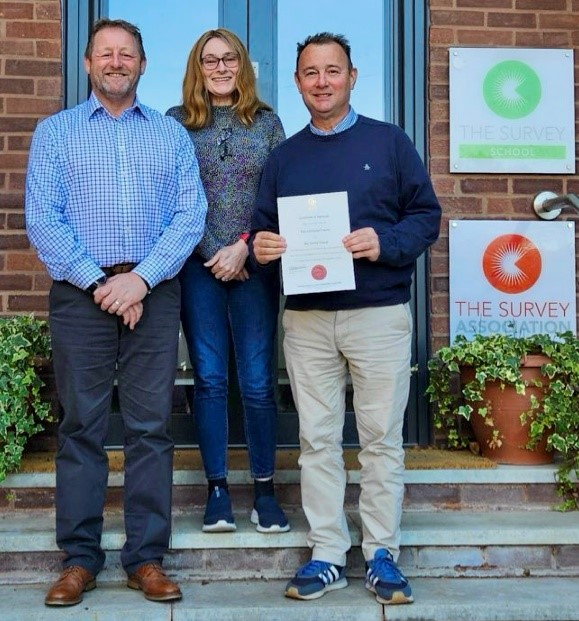
The audit scrutinised all aspects of the TSA Surveying Course, including its curriculum and how it measures its impact in preparing students for career challenges and opportunities. Past graduates, many now experts in their field, have recognised their time at The Survey School as a crucial starting point for their successful careers.
The surveying course delivers a comprehensive syllabus that covers all the varied subjects of surveying – topographical, measured buildings, utilities and GIS. It balances practical fieldwork with theoretical knowledge, so that graduates are equipped with the understanding and versatility needed across multiple sectors. Alan adds:
“We are committed to evolving the Surveying Course to include emerging technologies and methodologies. We’ll adapt so that our students continue to receive the very best foundational geospatial surveying course available in the UK”
The next TSA Surveying Course with space available begins 2nd March 2026.
Contact us now for an online application form or more information.
The Survey School recently partnered with the Ordnance Survey Northern Ireland (OSNI) to deliver a tailored training programme at their Craigavon facility.
A 5-day course, blending theory with practical exercises, was led by seasoned tutor David Bennett, himself a former Ordnance Survey Cartographic Surveyor of some 40 years’ experience.
The week aimed to refresh and enhance the skills of OSNI’s surveying professionals and share best practice.
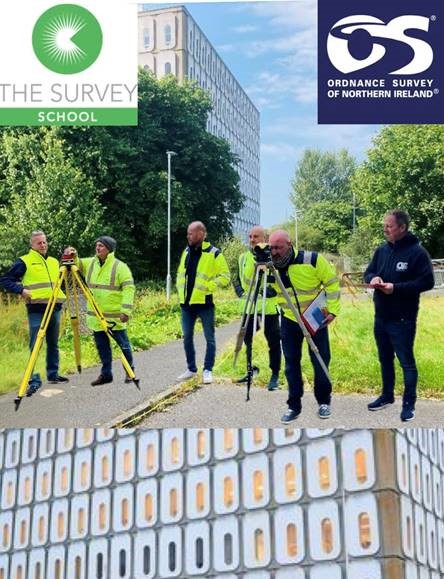
Participants’ positive feedback reported a significant improvement in their confidence and technical competencies, their teamwork and problem-solving.
“It was beneficial completing exercises with OSNI Surveyors with a mix of experience, as we benefited from shared ideas and there were some techniques that weren’t already known to me.”
“It was a good building block for someone like me, reasonably new to surveying. Dave was a gentleman! He picked up on all levels of understanding within the room and provided support around individual needs… I enjoyed it and I genuinely felt it helped my understanding.”
OSNI Topographical Field Surveyor, Philip Bell: “The balance of theory in the classroom and practical exercises outdoors allowed for constructive debate and learning between the students at various levels of experience. Also, the topics covered are enabling our staff to fulfil the specialist land surveying competencies of the Chartered Institution of Civil Engineering Surveyors (CICES) for working towards their professional membership.”
The Survey School is working to foster further collaborations between the school and government agencies, with 2 training courses being delivered for Natural Resources Wales this autumn.
Survey School Manager, Alan Mansell: “Initiatives like this not only bolster individual’s expertise but strengthen the surveying sector as a whole. The Survey School’s training offer includes everything from foundational courses for trainees to more advanced teaching for experienced professionals – and we are always happy to talk about delivering bespoke programmes”.
At The Survey School we receive email and phone enquiries from across the globe from those eager to get into surveying. We are always happy to advise on surveying careers. The people who contact us range in age, from school leavers to those who have been working for several decades in a related field and are keen to make a sideways move.
Land surveying is a profession that can be overlooked and often operates “behind the scenes”, yet its impact is felt in every new building, road and public project, and the demand for qualified professionals continues to grow.
Many people start their surveying journey with a passion for the outdoors and a keen interest in maths and geography or technology. Some may have found inspiration from friends or family who already work in the industry – or simply by accident!
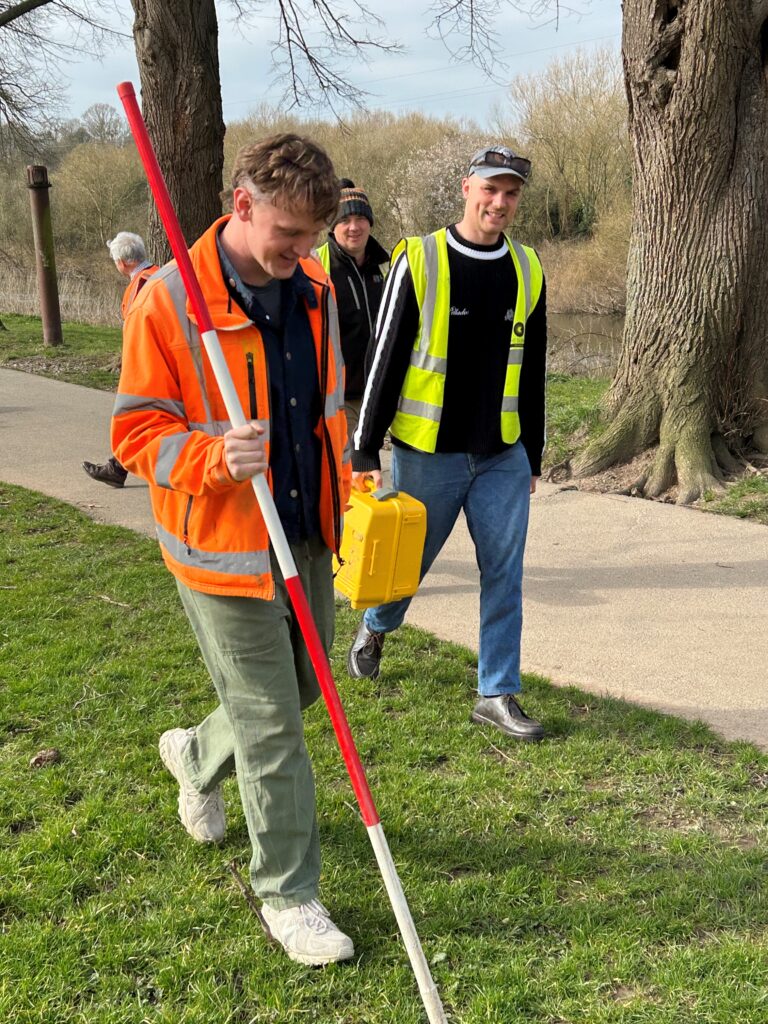
We’ve started to ask our course attendees how they discovered their current jobs in and what led them to surveying as a career. Here are just a few of their responses:
“I enjoy the outdoors and wanted a job that was a mixture of site work and office based”
“I got into it by pure chance. I saw an advert in the local newspaper for a Trainee Land Surveyor. The idea of working outdoors was what appealed to me initially.”
“It was a happy accident. My mum spotted a job advert in the local paper for something called an Assistant Land Surveyor.”
“I just spotted something on LinkedIn.”
Many surveyors can recount memorable moments in the field—the thrill of hiking to a remote location and setting up equipment under a clear blue sky – or in the pouring rain! The variety is the thing that appeals.
“As my tolerance to the wind and rain developed, so did my interest in surveying!”
“It’s fun, it’s complex, it gets my brain going. I enjoy being outside and in new places every day.”
“I needed a challenge as I was working inside a lab prior to this and that was very monotonous.”
While the technical aspects of surveying are significant, so too is the camaraderie developed among professionals. Many surveyors also recount experiences of teamwork, that cement a love for a profession that’s not desk-bound.
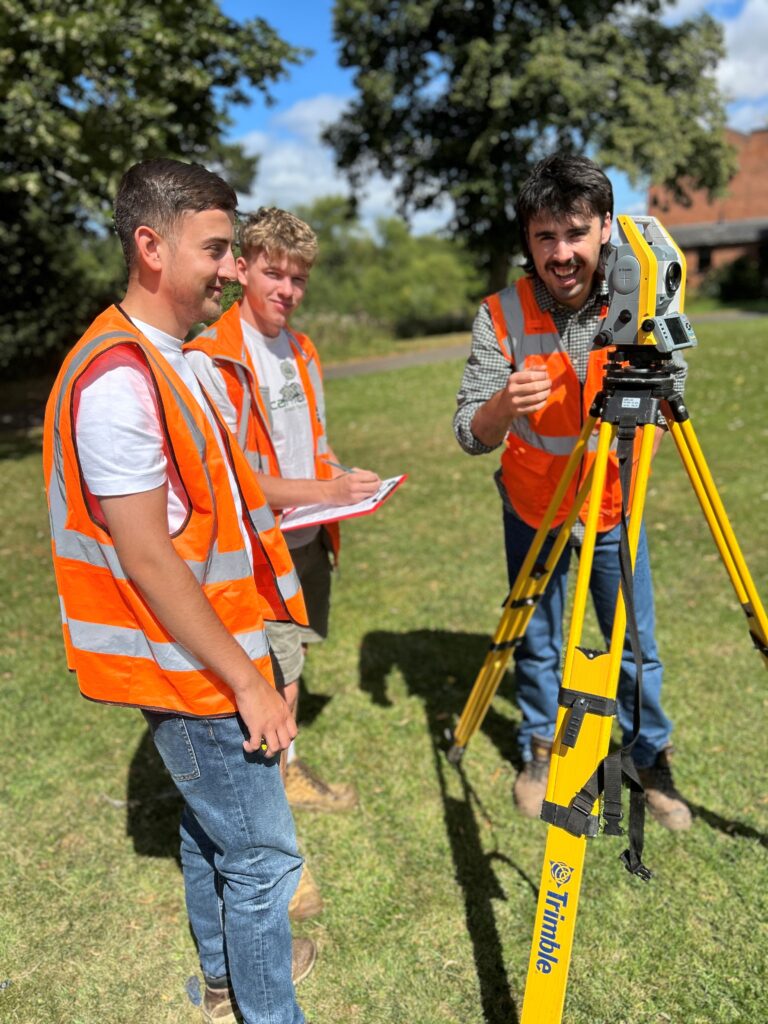
For those that stay with it, there’s also the potential for career progression – moving into managerial positions, specialising in niche areas or setting up your own business.
With the support of The Survey School, aspiring surveyors can find a pathway that suits them, whether starting from scratch or advancing their careers. Our short courses are designed to lay a solid foundation for those new to surveying. We recommend starting with five essential courses—Levelling, Total Stations, 5-Day Surveying, 2-Day GNSS, and 2-Day AutoCAD.
For those who have gained several months of experience, there is the more in-depth TSA Surveying Course, which also leads to a ProQual Level 3 Diploma in Engineering Surveying. Successful graduates not only receive a diploma, but also become eligible for various professional memberships, enhancing their career prospects significantly.
You might take a look at The Survey Association’s jobs page for any trainee surveying jobs in your area. There are also apprentice opportunities available. Apprenticeships are for people of all ages – not just for school or college leavers. There are opportunities for those looking to change careers or progress, such as this one, https://www.findapprenticeship.service.gov.uk/apprenticeship/reference/1000323052
To find out more about our TSA Surveying Course, go to https://www.surveyschool.org.uk/the-course/#book-now
It was an exciting day for The Survey School last week when we had two brand new interactive smart screens installed and officially opened our newly upgraded training room.
We are delighted to share our appreciation for KOREC Group and Trimble Geospatial for their generous sponsorship of a new interactive smart screen and training room and we are grateful to Leica Geosystems for their generous sponsorship of another smart screen.
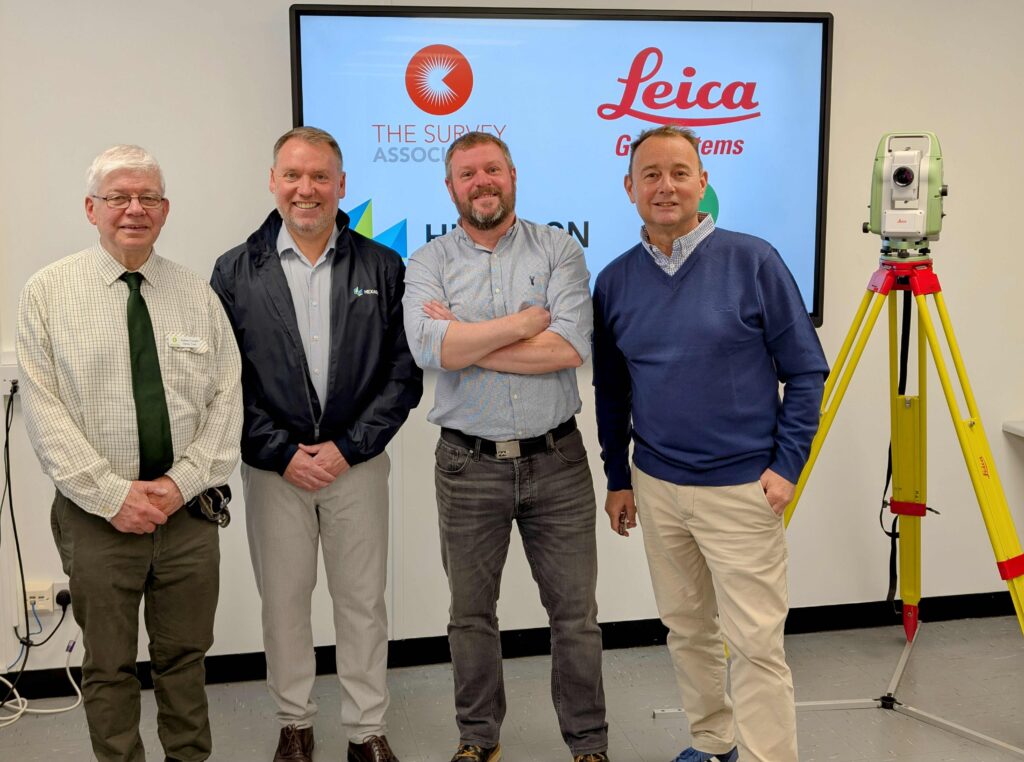
We were pleased to welcome representatives from each organisation to The Survey School for our official installation ceremony so they could see the technology and training room in use by some of our students. This cutting edge technology marks a significant step forward in enhancing our students’ learning experience—bringing lessons to life, boosting interactivity, and supporting our continued drive to improve both our hardware and teaching environment.
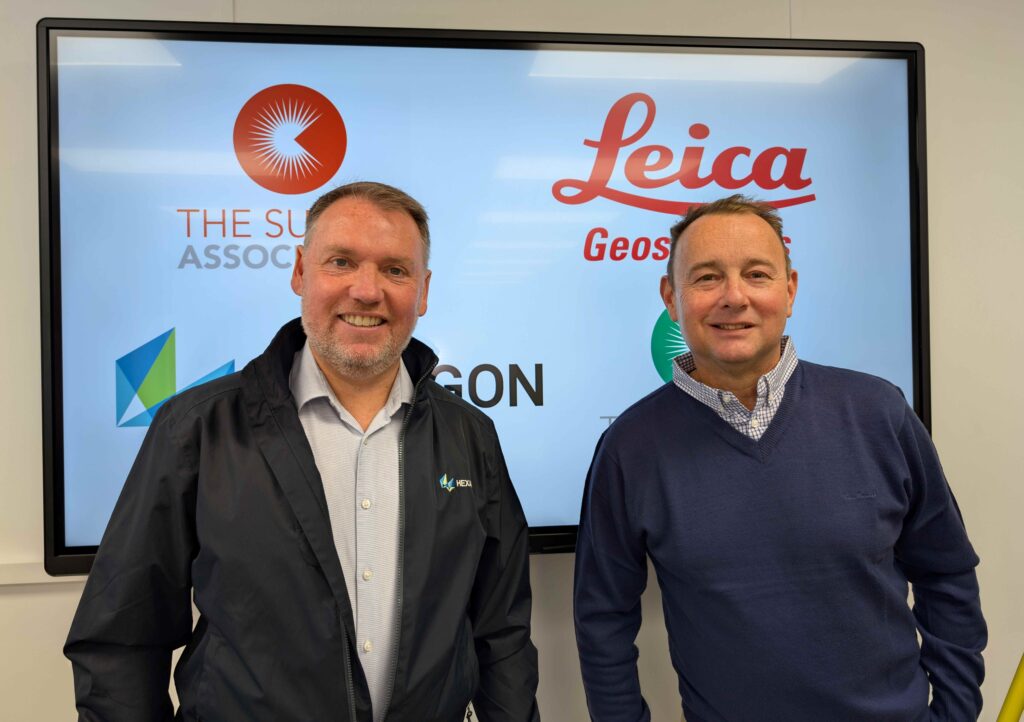
Alan Mansell, Survey School Manager, says,
“These exciting additions enhance the student learning experience, offering a more dynamic and engaging way to deliver course content. It also reflects our ongoing commitment to upgrading the school’s hardware and continually improving our teaching environment. Thank you to all these companies for their support and commitment to the future of surveying education.”
I had an interest in maps and mapping after completing a geological mapping project as part of my university degree. I wanted a career that was both outdoors but also technical and, after some research, I discovered surveying, which seemed like an obvious choice. Although, I didn’t know a huge amount about the profession until I began working at Kemp.
My key memory from The Survey School was the time spent coding Excel spreadsheets to help me solve the maths problems quickly for the assignments and classwork. They were so helpful throughout the course to identify calculation errors and therefore speed up my results.
The most valuable lesson I learned was understanding the calculations that the total station and surveying software use on a day-to-day basis. Understanding how problems can arise in the data collection process and the impact it has on accuracy computations has allowed me to become a more accurate surveyor in the field by minimising errors as much as possible.
My current role is a land surveyor, which covers the role of topographical surveying, measured building surveying, deformation monitoring and aerial surveys. I enjoy working with friendly and supportive colleagues, who have all played a part in developing my career. I enjoy visiting areas of the South-West I wouldn’t normally go to, or going behind the scenes of places the public would not get the opportunity to see. The expectation of working on large scale infrastructure projects and the prospect of making a positive impact on the local community has great appeal to me.
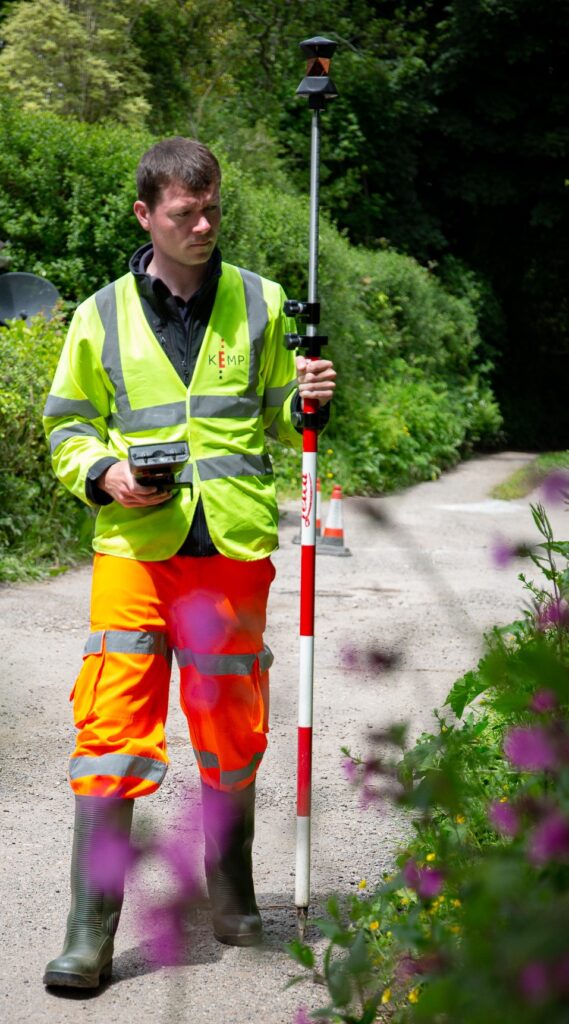
Technical, challenging, rewarding.
I have visited local schools in the county to discuss surveying as a career and my own journey into the profession. This has included giving practical demonstrations of the equipment involved as well as offering work experience to some students. This has encouraged students to apply and join Kemp.
When I was younger, I struggled to decide what career I wanted to do, simply because most of my experience came from a classroom environment. I think it’s important to apply for work experience in different fields, because even finding out what you don’t enjoy is an important step to finding a rewarding career. I didn’t know that much about surveying until I started working in the profession, but knowing what I did and didn’t enjoy from other jobs, helped me make an informed decision – and I haven’t looked back!
We have recently undertaken a large scale topographical and measured building survey in South Devon for the redevelopment of a shopping centre. We are currently processing the data to produce floor plans and elevations alongside our 3D modelling within Revit.
One of them was the St Austell to A30 link road when I had not long joined Kemp. I had just completed the surveying of borehole locations on site when the area was hit by a snowstorm. Within an hour there were at least four to five inches of snow on the ground and my vehicle was stranded. Fortunately, I was working with the client who had a 4×4 and generously drove me most of the way home. I still had to walk the last mile to my house carrying the GPS though! It just shows how quickly the weather can change in Cornwall and being prepared for whatever it throws at you.
My proudest career moment would be achieving my full membership with CICES in 2024. After all the years of work and experience, to go beyond the technical membership and to keep pushing myself to achieve member status was very satisfying.
To get the land surveyors we need in the future, we require the best and experienced to train them. We are very lucky to have some fantastic tutors working for The Survey School. Full and part-time, some working as tutors whilst also running their own successful surveying businesses.
We asked our Senior Tutors, Andrew Crumpler and Adam Ball, to tell us about a “typical” day – if there is such a thing – of a Survey School tutor. These tutors shed light on their responsibilities, longer term projects and goals.
How does your day begin?
Andrew: I’m normally at The Survey School around 8am to gather the materials and equipment ready for the students who start at 9am.
Adam: I cycle into work which means the first thing I need after that is a strong black coffee!
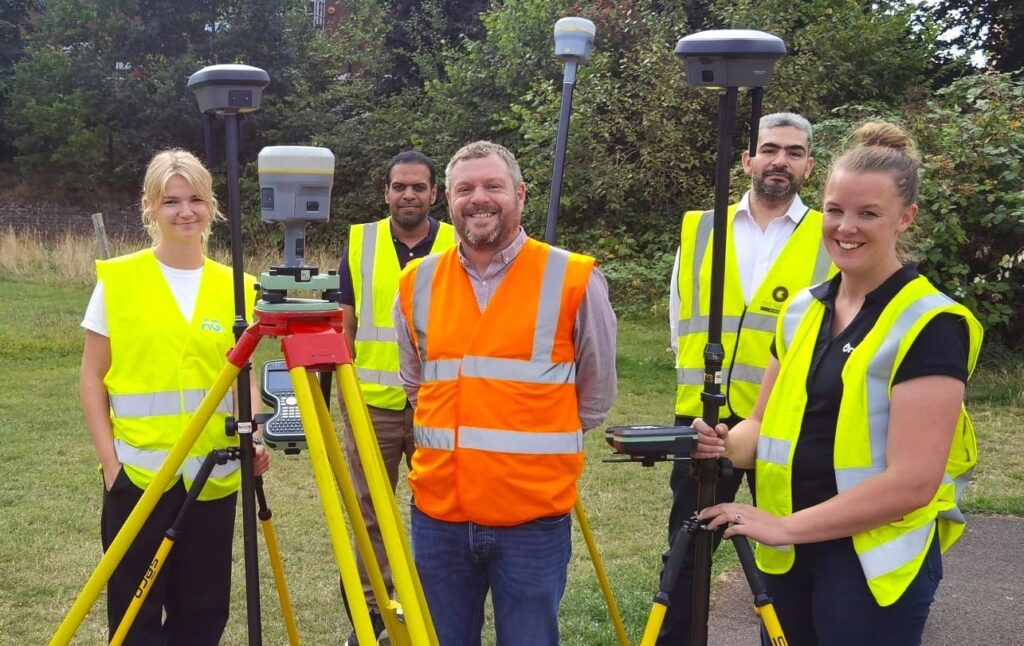
How is your day structured?
Andrew: I spend most of the day teaching – and standing up! Mornings are spent teaching the theory and doing worked examples. The afternoons find us mostly outside on practical exercises.
Adam: When not actively teaching, we’re marking student classwork, exams and assignments and writing reports, planning and preparing lessons and answering emails. Tutors also meet up to discuss plans for course content and share new ideas.
Andrew: Marking student work is a time-consuming process. It’s important to ensure that our marking is consistent and fair across all blocks of our 2-year TSA Course.
What led you to working as a tutor for The Survey School?
Adam: After 15 years working as a land surveyor I spent another 15 working in technical support and training for one of the major equipment manufacturers. I discovered the joy of sharing my experience and the satisfaction of helping to improve companies’ workflows and utilisation. This is what led me to taking the step into teaching: to continue to help to improve the surveying industry by showing passion and imparting knowledge to the students.
Andrew: I came into teaching after nearly 30 years working as a land surveyor. Like Adam, I have always enjoyed sharing my love of surveying with others and encouraging younger surveyors in the work place. Teaching was a natural progression.
What can your past experience bring to The Survey School?
Adam: Learning can be dull for students without being able to refer to real world examples. Past experience comes in very handy when students query the theory we’ve just covered or ask “Why do I need to know this?”, “When will I ever need it?” The answer is that surveyors need to be able to solve problems in very dynamic situations and broadening their skill-set can help them resolve an issue which they otherwise may have struggled with. It’s good to see that lightbulb ‘Eureka!’ moment where a trainee suddenly understands the theory behind why their company insists on a certain workflow, for example.
Andrew: I have seen a lot of changes in equipment during my time, but the fundamentals of surveying do not change. The new equipment brings a lot of advantages, especially in the speed and ease of acquiring data, as well as the sheer volume of data we now collect. However, without an understanding of the fundamentals, such as good geometry and the need for checking your work and redundant observations, it is easy for the novice surveyor to just write down the number on the screen without understanding if it is right or wrong. What experience brings, and what we teach the students, is to comprehend what the figures mean and to have an idea what the ballpark number should be, to avoid making silly mistakes. From experience we can teach where to look first if there is a problem and how to solve it.
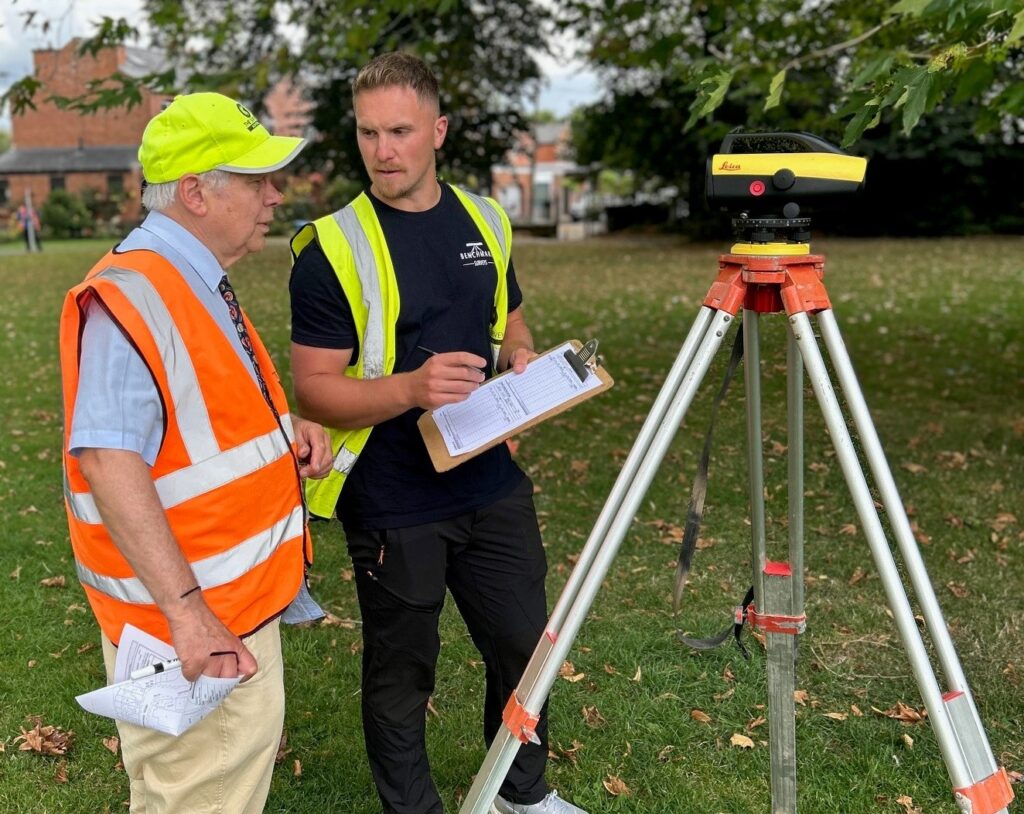
What do you think are the important skills and qualities of a good tutor, how would you describe your approach?
Andrew: Good tutoring prepares Survey School students for handling complex problems out in the field. Tutors support students as they acquire critical thinking skills and an understanding of what they are measuring and what the measurement might be used for. We encourage students to draw diagrams to illustrate the survey problem. Most surveyors, including myself, are better with pictures than with words. So if you can draw a good diagram you can do the maths.
All students work at different rates and come with different skills and experience. We encourage them to work effectively in a team, to learn from and to help their fellow students as well as learning and getting help from us. It is all part of the TSA Course.
Adam: Patience is a key quality for a tutor! All students learn and progress at different rates and it’s important to recognise this in order to be effective. I always try to make a connection between the theory and real-world applications. If the student can see the reason for the maths, they are far more likely to remember it. I’m also a big believer in making students recognise their own mistakes and correct it along the way. Students who learn to take their time will perform much better in real life work situations.
What do you like about tutoring?
Adam: I enjoy seeing the students’ confidence increasing over time, especially those who may have started the course with very little experience.
Andrew: It is encouraging the students, giving them the confidence in maths and seeing them understand the concepts you are explaining. The light bulb moment! I can see when they have put a lot of effort into their work and are really pleased with the results they have achieved. It is interesting to hear of the many projects students are working on and to learn about some of the innovative techniques they employ on site. We can then pass these onto the other students and help improve the level of skill in the industry.
What are some of the most challenging situations you have faced as tutors?
Andrew: Sometimes students do not have the full support of their companies, particularly when it comes to being given the time or equipment needed undertake the course assignments. We encourage students to let us know if they are having problems so we can contact their employer, or arrange to team them up with other members of the class.
Adam: As Andrew says, unfortunately some companies don’t fully realise the importance of giving the student the freedom to attempt an individual assignment, as this is often where they will first apply the skills and methodologies they have learnt whilst in the classroom.
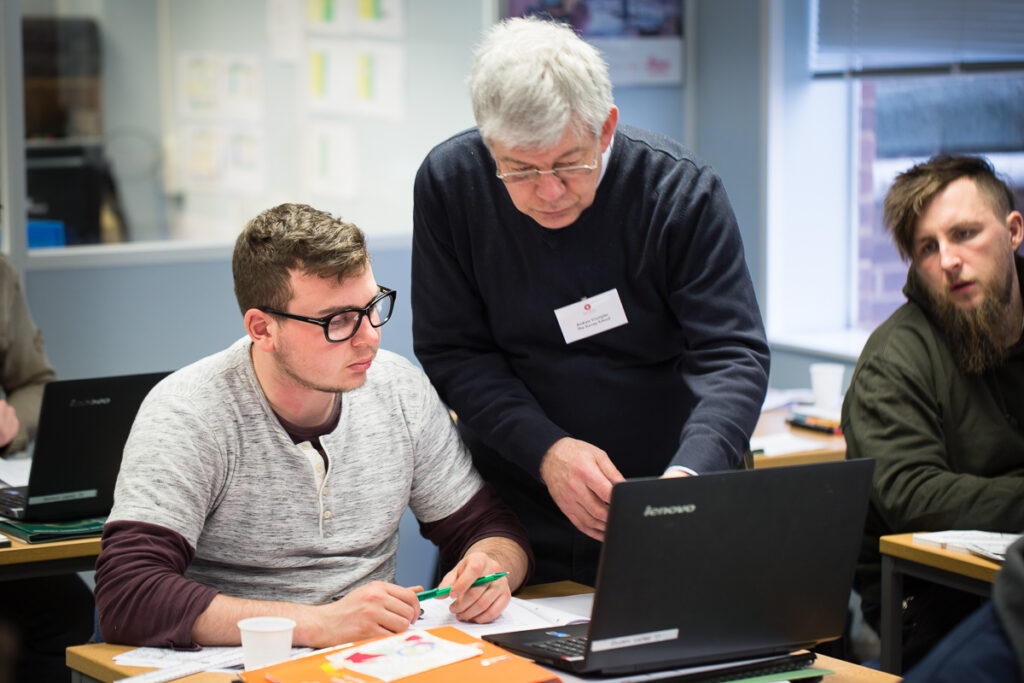
What does the future hold for the development of The Survey School Courses?
Adam: We will continue to add further aspects to the courses, as there are so many rapid advances in data capture techniques, such as mobile laser scanning and photogrammetry, which due to their ‘black box’ automated nature, many trainees are using without understanding how the principles of surveying should still be applied.
Andrew: I think that there is a great future as people are recognising the need to train up more skilled workers, particularly in construction. The Survey School has a wide variety of courses with which surveyors can improve their knowledge and skills, something that all employers can benefit from.
Proudest tutoring moment?
Andrew: The student Awards Day is always a special time, when we get to celebrate students’ graduation from the TSA Surveying Course. It is rewarding to see how proud the students are and to see them recognised for all the hard work they have put in, especially those students who have sponsored themselves.
Adam: Being quite new to the role, it’s still to come! It was great to attend my first student awards day as a tutor last year at the British Motor Museum. Seeing the students enjoying the appreciation of the land surveying community and realising that they are an important part of that community is something I think will always give me a sense of pride that I have played a small part in.
Andrew: We have had some outstanding students over the years. It is always nice to hear how they are progressing in their careers and to know that we have played a small part in encouraging them on their way. After all, the President of the TSA is a past Survey School student!
What do you enjoy doing when you’re not at The Survey School?
Adam: Outside work I enjoy spending time with my family, building a campervan and playing hockey at a steadily decreasing speed!
Andrew: I enjoy spending time with my family, walking on the Malvern Hills, doing a bit of photography or driving my old Land Rover.
To find out more about our tutors and the rest of our team, please visit https://www.surveyschool.org.uk/about-us/
To discovder more about TSA Surveying Course, please go to https://www.surveyschool.org.uk/the-course/
Sygma Solutions Ltd has recently announced the continuation of its successful programme offering free utility mapping training for young people. This initiative is open to any company employing, or having employed within the last 12 months, a young person under the age of 23.
Following a great response in 2024, the offer is limited to one place per company and spaces are soon snapped-up, so early registration is highly recommended!
After the attendee has gained site experience for a minimum of 12 months, Sygma will also provide:
What’s the catch? None! There are no hidden conditions.
Peter Ashcroft, MD at Sygma said,
“As Sygma approaches our 20th anniversary, we recognise more than ever what we owe to this industry and are committed to supporting the next generation and doing whatever we can to support the profession and raise standards”.
Alan Mansell, Survey School Manager commented,
“Utility Mapping is a crucial skill in various industries. Through this programme, Sygma Solutions Ltd not only benefits young people but also helps businesses grow and adapt to our profession’s needs.”
For more details, please contact, neal.sadd@sygma-solutions.com.